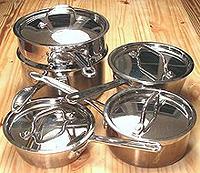
SAFARI
Users
General and History
Types of Stovetop Cookware
General & History
Fire was not tamed by humans, but by some of our pre-human ancestors in Africa - it is a skill we inherited from them. Cooking is extremely important. Paleo-antropologists now think it was cooked food that allowed our distant ancestors to develope large, energy consuming brains. We have been cooking food so long our digestive tract is no longer well adapted to a raw food diet - despite what some raw food enthusiasts claim (many of whom are dangerously thin).
Plant foods are very difficult to digest uncooked, and a great many are toxic - until cooked. Not only do our simian relatives have restricted food options, many have to spend as much as 8 hours a day just chewing to make plant foods digestible. Meats are difficult to catch in the wild, and may then contain various parisites and diseases that can only be rendered safe by cooking.
Our first ovens were pits filled with red hot rocks and covered over with wet leaves and soil. Cooking time could be a day or more. Our first "stovetop" cooking was done in hollowed out logs. How do you make soups and stews in a hollowed out log? You partially fill it with water and food, then toss in a number of those same red hot rocks to bring it to a boil. Soup will be ready in an hour or so. This was much more convenient than the pit oven. These logs were eventually replaced by clay cauldrons set over hot coals, then bronze cauldrons, and finally iron cauldrons.
Some foods, like flat breads and strips of meat, could be cooked directly on flat rocks that had been heated in a fire until nearly red hot - the predecessor of our frying pans, skilets, tavas and comals.
Today, our kitchens are not well adapted to producing red hot rocks, and nor are they even well adapted to cauldrons, but we have a wide and sometimes confusing array of stovetop cooking devices more efficient even than the cauldron and flat rocks.


